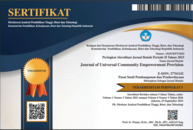Processing of Woven Bamboo for the Economy of Village Communities
DOI:
https://doi.org/10.55885/jucep.v2i3.256Keywords:
Woven bamboo, Village communitiesAbstract
The economic benefits of processing bamboo are examined in this thesis study. This paper examines the economic benefits of bamboo processing, including income generation, job creation, links to other economic sectors, and environmental benefits, as well as the operations involved in processing bamboo, such as harvesting, processing, weaving, and finishing. Lack of access to technology and markets, the cyclical nature of bamboo, and a lack of funding are just some of the difficulties that village groups who engage in bamboo processing encounter, and they are all explored in the research. The research concludes by outlining strategies for rural areas to maximize their financial gain from bamboo processing, such as expanding their product line, advertising their location as an eco-tourism destination, working together with designers and other interested parties, and educating and training their workforce. The research concludes that bamboo processing has the potential to become a sustainable economic activity for rural communities and offers suggestions for policy-makers, development organizations, and interested citizens.References
Aswandi, A., & Kholibrina, C. R. (2021). Empowering Women on Bamboo Utilization and Conservation in the Lake Toba Catchment Area of the North Sumatra Province of Indonesia. 47. https://doi.org/10.3390/iecf2020-08026.
Bergmann, T., & Utikal, H. (2021). How to support start-ups in developing a sustainable business model: The case of an european social impact accelerator. Sustainability (Switzerland), 13(6). https://doi.org/10.3390/su13063337
Borowski, P. F., Patuk, I., & Bandala, E. R. (2022). Innovative Industrial Use of Bamboo as Key “Green” Material. Sustainability (Switzerland), 14(4). https://doi.org/10.3390/su14041955
Callo-Concha, D., Jaenicke, H., Schmitt, C. B., & Denich, M. (2020). Food and Non-food biomass production, processing and use in sub-Saharan Africa: Towards a regional bioeconomy. In Sustainability (Switzerland) (Vol. 12, Issue 5). MDPI. https://doi.org/10.3390/su12052013
Dai, Y., & Hwang, S. H. (2021). Social innovation design and sustainability of youth-led bamboo craft brand in zhushan township, Taiwan. Sustainability (Switzerland), 13(17). https://doi.org/10.3390/su13179911
Lee, B., Rhee, H., Kim, S., Lee, J. W., Koo, S., Lee, S. J., Alounsavath, P., & Kim, Y. S. (2021). Assessing sustainable bamboo-based income generation using a value chain approach: Case study of nongboua village in Lao PDR. Forests, 12(2). https://doi.org/10.3390/f12020153
Ncube, A., Mtetwa, S., Bukhari, M., Fiorentino, G., & Passaro, R. (2023). Circular Economy and Green Chemistry: The Need for Radical Innovative Approaches in the Design for New Products. Energies, 16(4). https://doi.org/10.3390/en16041752
Pawlak, K., & Kołodziejczak, M. (2020). The role of agriculture in ensuring food security in developing countries: Considerations in the context of the problem of sustainable food production. Sustainability (Switzerland), 12(13). https://doi.org/10.3390/su12135488
Yeh, J. H. Y., Lin, S. C., Lai, S. C., Huang, Y. H., Yi-Fong, C., Lee, Y. T., & Berkes, F. (2021). Taiwanese indigenous cultural heritage and revitalization: Community practices and local development. Sustainability (Switzerland), 13(4), 1–16. https://doi.org/10.3390/su13041799
Downloads
Published
How to Cite
Issue
Section
License
Copyright (c) 2023 Journal of Universal Community Empowerment Provision

This work is licensed under a Creative Commons Attribution-ShareAlike 4.0 International License.
















